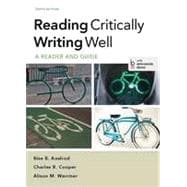PACKAGE THIS TITLE WITH OUR 2016 MLA SUPPLEMENT, Documenting Sources in MLA Style (package ISBN-13: 9781319087975). Get the most recent updates on MLA citation in a convenient, 40-page resource based on The MLA Handbook, 8th Edition, with plenty of models. Browse our catalog or contact your representative for a full listing of updated titles and packages, or to request a custom ISBN.
Reading Critically, Writing Well helps students read for meaning and read like a writer, and it guides them as they apply what they’ve learned to their own writing. Each of the book’s 9 assignment chapters includes a genre-specific guide to reading that challenges students to analyze the authors’ techniques as well as a step-by-step guide to writing that helps them apply these techniques to their own essays in the genre. With 13 provocative new professional selections (plus 8 multimodal selections in e-Pages), an array of student models, hands-on activities for critical analysis and invention, and multiple opportunities for summary and synthesis, this text is the right choice for any instructor who wants to help students learn to read critically and write well. Now with e-Pages: multimodal reading selections that come alive online with videos, podcasts, quizzes, and more.








